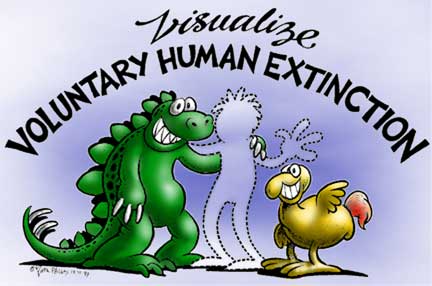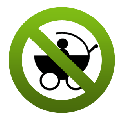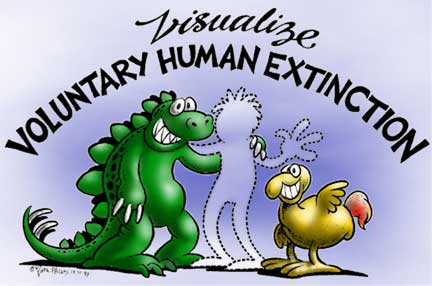 Art: Nina PaleyLes U. Knight (get it?) is the face and the force behind the Voluntary Human Extinction Movement (VHEMT, pronounced vehement). Motto: “May we live long and die out.”
Art: Nina PaleyLes U. Knight (get it?) is the face and the force behind the Voluntary Human Extinction Movement (VHEMT, pronounced vehement). Motto: “May we live long and die out.”
It might sound like a strident or mean-spirited campaign, but Knight is certainly not a strident or mean-spirited guy. He’s hit on a creative way to talk about the population problem and the damage humans do to ecosystems everywhere, without calling for reproductive coercion (note the prominence of the word voluntary). The gist: If we all just decided to stop procreating, humans would gradually and peacefully clear out and make room for everything else.
The delightfully irreverent yet good-hearted VHEMT website is witty enough to make a Grist punster downright jealous. A sampling of the wisecracking:
- “If sex is an urge to procreate, then hunger’s an urge to defecate.”
- “It has been suggested that there are only two chances of everyone volunteering to stop breeding: slim and none.”
- “Warning: Some of the words in the following messages may be offensive to those who find certain combinations of letters offensive.”
- “We might look for an enemy to attack when championing our righteous cause, but in reality our enemy doesn’t have a butt to kick. In the end, the real ‘enemies’ are human greed, ignorance, and oppression. We can achieve more by promoting generosity, awareness, and freedom than we can by vainly kicking at a buttless foe.”
Knight launched the site and the movement in 1996, but he claims no ownership. Thousands of people from all around the world have adopted the VHEMT cause as their own; some of the most dedicated have translated the site into 16 other languages. There’s no formal membership; if you agree with the movement’s goal, you can just declare yourself a volunteer or supporter.
I chatted with Knight to get the scoop on his vehement beliefs.
—–
Q. How did the whole VHEMT thing come about?
A. It came about for me the same way it’s come about for millions of other people. You just start looking at the world and thinking about the problems and solutions to the problems, and eventually you come down to the fact that our excessive breeding has increased the population to the point where we’re not taking care of everybody, and if there weren’t any humans on the planet, everything would be fine. The biosphere would recover, species that we are driving to extinction would no longer be endangered and could flourish, and there’d be no more human suffering.
It’s an idea that’s probably been around for a very long time — I just gave it a name.
Q. Definitely we humans have made a mess of things on this planet, but we’ve made some great stuff too — music, art, literature. Wouldn’t it be a shame to see all of that human culture disappear?
A. We wouldn’t see it disappear.
Q. Because we wouldn’t be here?
A. [Laughs.] All those things are fun for humans, and I hope we continue doing them right to the last day, but we haven’t done anything that benefits the rest of the planet. The rest of creation could do just fine without us. Since even before we became Homo sapiens, we’ve been adversely impacting ecosystems that we inhabited.
Q. Was there a particular moment when you decided not to have kids?
A. No, it was gradual. Like most people, I always assumed that I would, because that’s what we’re culturally conditioned to think. And then as time went on, I realized that I really didn’t want to create my own. I did become a stepparent, so it isn’t that I don’t like kids and don’t really want to be a parent — it’s just that I don’t think we should create more of us, especially since we’re not taking care of all of us who are here today.
Q. Have you felt like not having a kid is a sacrifice that you’re making for a greater good?
A. No, I haven’t sacrificed at all. I’ve had the opportunity to be a parent without breeding. I have lots of kids in my life.
It is a sacrifice for a lot of people, if they’ve always wanted to have kids and they don’t see any other way of doing it. Or for women, if they really want to experience that whole pregnancy and childbirth part of life, and then decide not to for the sake of the planet or even for the sake of the child that’s not born.
 If you like this article, you’ll love my piece on being a GINK: green inclinations, no kids
If you like this article, you’ll love my piece on being a GINK: green inclinations, no kids
There’s so much pressure to breed in all societies that it’s a wonder that as many people as do choose not to — 20 percent of American women over 40, [according to] that new study. And in a lot of cultures, women are outcast and are driven to suicide if they cannot conceive, even though of course it could be their partner’s fault.
The single most important issue is the increased status of women, not just in developing countries but all over the planet — education, reproductive freedom. Women need the freedom and the opportunity to pursue their own lives beyond being a wife and mother, and in a lot of countries they don’t have that. Even in America, I think a lot of women don’t feel that they have an option.
The basic right to breed is well-established and fought for, even though it’s not threatened. The basic right to not breed barely exists in some places, doesn’t exist in many places, and needs to be defended.
There are quite a few women who are mothers on the VHEMT list that I moderate, and some of them were coerced into having their kids. They’re not saying, “I wish my kids were never born.” They’re saying they find it encouraging that by getting their message out, other women don’t have to go through the life that they went through.
Q. Are there more men or women who are VHEMT volunteers, or is it about even?
A. It seems to be about even, and that, I think, is unusual. Population-awareness groups have always been male-dominated, and to their detriment. Men tend to see the world more mechanistically, more like a big machine: If you do the right tinkering, then things will come out right, and the baby-making portion of the machine is overproducing, so if we can turn that knob and adjust it — which means control women’s lives — then it would run properly again. So the solutions have been more what would be called population control rather than reproductive freedom. And reproductive freedom is what we really need. Our population is already far too controlled — it’s control that prevents people from having the freedom to choose how many children they have.
Several hundred million women don’t have the freedom to choose how many children they have. Maybe more, who knows? I think it could be a couple billion, at least. There is no place where true gender equality exists, and the greater the gender equality, the lower the birthrates and all the other good things that follow it, like lack of oppression.
I think that things are changing. [The population movement] is not as control-oriented as it was. The Optimum Population Trust is a good example of the new wave of it.
Q. I’ve heard from some people that being childfree can feel lonely. Are there any local chapters of VHEMT volunteers who physically meet together? An online community is great and lets you know you’re not alone, but it’s not the same as having people to go out with on a Saturday night.
A. No, I have never heard of any group of VHEMT volunteers getting together, and I wouldn’t be interested in it myself. I don’t think it’s such a great idea [because] we are a very varied group of people, and the only thing we really have in common is that we think that humans should stop breeding, and we don’t even agree on going extinct. There are people who are supporters of the movement who agree that the intentional creating of anyone anywhere can’t be justified today, but maybe someday if we get it down to a reasonable number, you know a million or so, then we’ll rethink it. Even something as basic as a woman’s right to an abortion — there are [VHEMT advocates] who consider themselves pro-life. The only thing that we absolutely all agree on is that humans should not conceive whenever possible.
Q. How do you communicate with other VHEMT volunteers and supporters? Are there discussion boards on the VHEMT site, or listservs?
A. Yes, there are several of them. There are a couple of large ones on Facebook [here and here]. I moderate one on Yahoo for volunteers or supporters. I also moderate two others, one for the specific purpose of debating whether or not we should breed, and the other whether or not we should go extinct. So there are opportunities for people to argue against it.
Q. A lot of people get touchy when one talks about choosing not to have children. What’s your strategy for broaching the topic? Say you’re at a dinner party with a lot of people you don’t know.
A. I try to figure out what their perspective is before I give my perspective, so I can present it in such a way so that it’s not an affront to their existing perspective on life. I have developed ways over the years of wording it so that it’s not so confrontational. I think it is easy to get fanatical — you know, “There’s only one way to do it and everybody’s got to do it my way! Hurry up! The world is falling apart!” I think it’s more important to maintain friendships and relationships than it is to try to convert someone to your ideology.
People who are planning on having kids know how I feel about it, and we joke about it. I say, “I’m going to have to file an environmental impact statement for that!”




